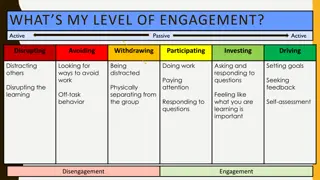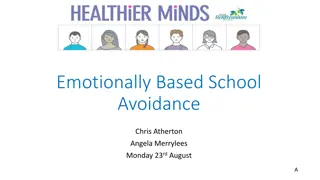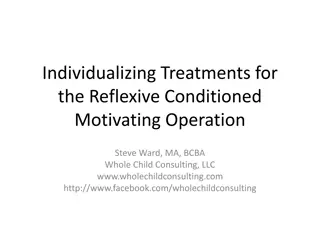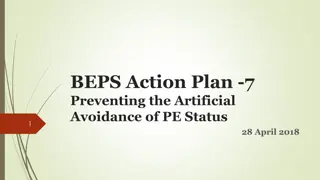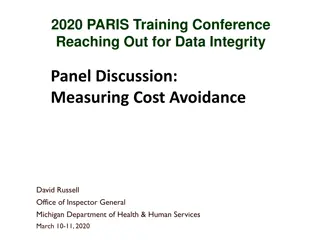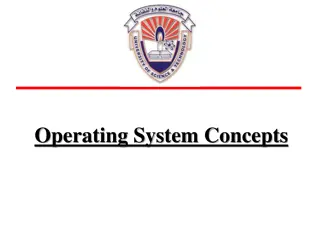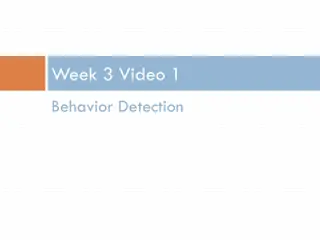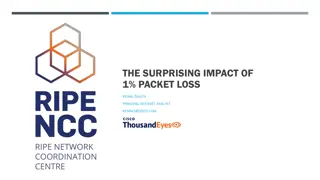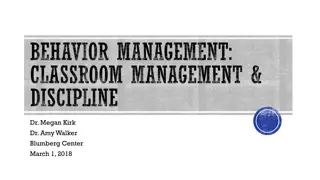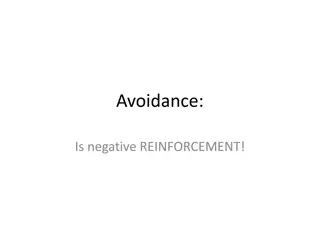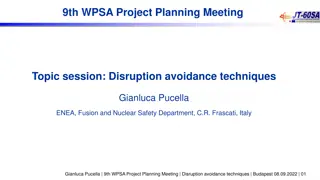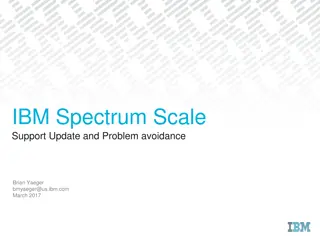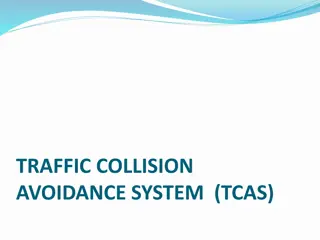Function Based Thinking
Function-based thinking in Missouri Schoolwide Positive Behavior Support, emphasizing data-based decision-making, mission clarity, and effective teaching practices. Understand how behavior is related to the environment and how environmental interventions play a key role in shaping expected behaviors
6 views • 27 slides
Addressing Predatory Behavior in the Fellowship
Predatory behavior, especially towards vulnerable members, is a concerning issue in the fellowship. This behavior includes unwelcome advances, exploitation of power dynamics, and institutional sexism. The discussion on predatory behavior necessitates honest dialogue and a united approach for a safer
3 views • 13 slides
Levels of Engagement in Learning Behavior
Understanding different levels of engagement in learning behavior, ranging from active participation to avoidance and disruption. Each level is described with examples, such as participating by paying attention and investing by seeking clarification when needed. Recognizing these behaviors can help
0 views • 7 slides
Understanding Emotionally Based School Avoidance in Children and Young People
Emotionally Based School Avoidance (ESBA) is a common issue among children and young people, leading to school attendance concerns. This article sheds light on the diverse presentation of school avoidant behaviors, effective strategies for addressing them, and the prevalence of anxiety and stress as
1 views • 42 slides
Understanding Consumer Behavior in Marketing
The design of a marketing program starts with understanding consumer behavior. Consumers, as the end users, play a crucial role in shaping market trends. Producers seek insights into consumer personas, market behaviors, and influencing factors. Management focuses on the consequences of consumer beha
2 views • 26 slides
Individualizing Treatments for Reflexive Conditioned Motivating Operation
Understanding the importance of individualizing treatments for escape/avoidance behaviors in individuals with ASD. Factors such as behavior change speed, alternative repertoires, and aversive stimuli considerations are crucial for effective intervention. Generic interventions may not address behavio
1 views • 47 slides
Understanding Different Types and Classifications of Heliports
Heliports, helidecks, helistops, and helipads serve as key landing areas for helicopters. They come in various classifications including military, federal, private use, public use, commercial service, and personal use. Factors influencing site selection include traffic considerations, obstruction av
0 views • 21 slides
Autonomous Obstacle Avoidance Robot Using ROS, Lidar, and Raspberry Pi with Matlab Path Planning
Obstacle avoidance in robotics has evolved from basic collision avoidance to autonomous path planning with the use of Lidar and ROS. This project involves mapping the environment using Lidar scans and implementing a path planning algorithm in Matlab to navigate around obstacles. By utilizing a Raspb
0 views • 15 slides
Understanding Human Behavior: Foundations and Factors
Human behavior is a multifaceted subject influenced by genetic makeup, culture, and individual values. It encompasses both overt actions and covert thoughts, a product of the individual and environmental factors. Psychologists study behavior from visible (overt) actions like playing football to inne
0 views • 20 slides
Preventing Artificial Avoidance of PE Status in International Business: Case Studies & Exemptions
Explore case studies on Agency PE and Preparatory/Auxiliary Services, along with PE exemptions for specific activities to prevent the artificial avoidance of Permanent Establishment status in the global tax landscape.
2 views • 14 slides
Understanding Deadlock: Conditions, Detection, and Avoidance
Explore strategies for dealing with deadlocks, from detection and recovery to dynamic avoidance. Learn about deadlock avoidance methods like being conservative in resource granting and dive into safe and unsafe states, the Banker's algorithm, and the four conditions for deadlock. Discover how to pre
0 views • 15 slides
Understanding Normal and Abnormal Behavior: Perspectives and Definitions
Normal behavior varies from person to person and society, influenced by individual preferences and societal norms. Abnormal behavior is characterized by an inability to function effectively or personal discomfort. The concept of normality and abnormality in psychology raises complex questions about
2 views • 8 slides
Michigan OIG: Cost Avoidance and Investigation Types Overview
Michigan's Office of Inspector General (OIG) within the Department of Health & Human Services conducts investigations to ensure data integrity, targeting areas like cost avoidance, fraud, and program violations in public assistance programs. The OIG's efforts have resulted in significant savings and
0 views • 12 slides
Understanding Deadlock Avoidance in Operating System Concepts
Deadlock Avoidance is a critical concept in operating system design to prevent system resources from entering a deadlock state. By requiring additional information about resource requests and utilizing algorithms like the banker's algorithm, systems can dynamically allocate resources to avoid circul
1 views • 29 slides
New Congestion Avoidance Methods for IP Networks
This research presentation highlights the challenges of IP network failures, focusing on planned and unplanned scenarios. Dr. Simon Tembo discusses innovative methods to prevent congestion during failures, including a backup topology design for unplanned failures and a congestion avoidance approach
2 views • 40 slides
Understanding Social Anxiety and Avoidant Behaviors
Social anxiety involves intense fear and avoidance of social situations, leading to catastrophic thinking and physiological reactions like performance anxiety. Individuals may anticipate criticism, rejection, or embarrassment, which can interfere with their functioning. This condition can manifest a
3 views • 30 slides
Understanding Human Behavior: Insights for Social Workers
This material delves into the intricacies of human behavior, exploring factors influencing behavior such as heredity, environment, intelligence, needs, and motives. It covers the concept of human behavior, stages in life from conception to old age, and theories of human development by eminent psycho
2 views • 71 slides
Developing an Autonomous Robot Platform for Robotics Enthusiasts
In the journey to simplify entry into robotics, the autonomous robot platform project aims to offer mobility and communication capabilities. Addressing the limitations of existing hobby and commercial robots, the goal is to create an affordable, user-friendly system that navigates autonomously, comm
0 views • 13 slides
Understanding Behavior Detection Models in Educational Settings
Explore how behavior detectors automatically infer student behaviors from interaction logs, such as disengaged behaviors like Gaming the System and Off-Task Behavior, as well as Self-Regulated Learning (SRL) behaviors like Help Avoidance and Persistence. Discover the goal of identifying these behavi
0 views • 18 slides
Plant Responses to Water Stress in Agricultural Management
Understanding how plants respond to water stress is crucial for effective agricultural management. Stress can affect plant growth and development, leading to various adaptations such as resistance, avoidance, and tolerance. This course explores the physiological mechanisms behind plant stress respon
0 views • 44 slides
Understanding the Impact of 1% Packet Loss on TCP and the Cubic Congestion Avoidance Algorithm
Delve into the surprising effects of even 1% packet loss on network flows, the methods TCP uses to mitigate loss, and how the CUBIC congestion avoidance algorithm works. Explore the researched but not quantified problem of packet loss and learn about a test methodology using Ubuntu hosts to measure
0 views • 24 slides
Understanding Behavior Management in Classroom Settings
Explore the essential topics of behavior management, classroom strategies, and discipline in educational settings. Delve into the functions of behavior, impact of trauma on learning, and effective management techniques. Learn how to identify underlying reasons for student behaviors, discuss behavior
0 views • 76 slides
Targeting Emotions to Facilitate Behavior Change in Older Adults
Efforts in changing health behavior have traditionally focused on social and cognitive factors, but recent evidence highlights the importance of affective states in decision-making and behavior change. Janey Peterson discusses the role of emotions in achieving and sustaining behavior change to benef
0 views • 11 slides
Grading Criteria for Effort and Behavior in Educational Reporting
Effort and behavior in educational settings are evaluated based on criteria ranging from Excellent to Causing Concern. Pupils demonstrating excellent behavior show respect, responsibility, and positive engagement in learning. Those with good behavior exhibit cooperation and respect for others, albei
0 views • 9 slides
Understanding Avoidance Behavior and Its Theories
Avoidance behavior involves negative reinforcement to increase the frequency of operant responses, not punishment. Different types of avoidance tests, such as discriminated avoidance and shuttle avoidance, are used to study negative reinforcement. The Two-Factor Theory of avoidance conditioning expl
0 views • 61 slides
Enhancing Cost Avoidance Strategies in Medicaid Programs
Explore the impact of Veterans Benefits and Long-Term Care programs on reducing expenditures, leveraging third-party liabilities, and maximizing premium savings through managed care. Key data points include cost avoidance per client, interstate matches, and premium savings across multiple matches. T
0 views • 10 slides
Drone Collision Avoidance Simulator for Autonomous Maneuvering
Our project focuses on developing a drone collision avoidance simulator using NEAT and Deep Reinforcement Learning techniques. We aim to create a model that can maneuver obstacles in a 2D environment, enhancing performance and survivability. Previous attempts utilizing non-machine learning solutions
0 views • 28 slides
Overview of Canadian and South African General Anti-Avoidance Rules (GAARs)
This review discusses the General Anti-Avoidance Rules (GAARs) in Canada and South Africa, focusing on the criteria for identifying avoidance transactions and impermissible avoidance arrangements. The Canadian GAAR targets transactions seeking tax benefits, while the South African GAAR focuses on bu
0 views • 15 slides
Analysis of Tax Avoidance Transactions in Case Study on GAAR Application
The case study explores the incorporation of a business into a corporation to realize tax benefits, including tax deferral and lower rates. It raises questions on whether the transactions were primarily for tax avoidance purposes, highlighting the complexities of tax planning and the application of
0 views • 47 slides
PBIS Expectations and Behavior Flowchart
The PBIS flowchart outlines behavior expectations and interventions for minor and major incidents in a school setting. It covers disrespectful behavior, disruption, defiance, property damage, theft, possession of weapons, and more. The flowchart guides teachers and staff on managing and addressing s
0 views • 6 slides
Understanding GST Fraud and Avoidance Schemes
Exploring the nuances between tax fraud and tax avoidance in the context of GST, this content delves into types of GST abuse, Division 165 anti-avoidance rule, scheme structures, and consequences of GST fraud. Learn about the implications of dishonest tax practices and lawful tax conduct in the real
0 views • 10 slides
Understanding BEPS Action Plan 7: Preventing Artificial Avoidance of Permanent Establishment Status
The Action 7 Report aims to prevent artificial avoidance of Permanent Establishment (PE) status by making changes to the PE definition in the OECD Model Tax Convention. BEPS refers to tax planning strategies exploiting tax rule gaps to shift profits to low-tax locations. The OECD issued 15 action pl
0 views • 10 slides
Effective Coping Strategies for Stress Management
Avoidance coping is described as a maladaptive way of dealing with stress by avoiding the source of discomfort. In contrast, active coping involves addressing stressors directly through cognitive or behavioral strategies. Avoidance coping can lead to increased stress and conflict in relationships, w
0 views • 11 slides
Utilizing Disruption Avoidance Techniques in Plasma Control for Enhanced Stability
Exploring disruption avoidance techniques in plasma control is crucial for maintaining stability and safety in operating scenarios. Gianluca Pucella discusses topics such as plasma disruptions, prevention methods, emergency shutdown protocols, and disruption prediction models involving machine learn
0 views • 7 slides
Function-Based Behavior Support Plans: A Comprehensive Guide
Explore the process of developing Function-Based Behavior Support Plans (BSP) using Functional Behavioral Assessment (FBA). Understand the concepts of function and functional behavior assessment, learn how FBA/BSP fits within a multi-tiered support system, and practice developing BSP for students. D
0 views • 74 slides
IBM Spectrum Scale Software Support Update and Problem Avoidance Overview
Expanding support team in China, improving time zone coverage, enhancing problem classification, and implementing best practices in problem avoidance are key focuses of IBM Spectrum Scale Software Support. With a dedicated team in Beijing, response times for production outages have decreased, leadin
0 views • 36 slides
Understanding TCAS - Traffic Collision Avoidance System
A Traffic Collision Avoidance System (TCAS) is a vital aircraft collision avoidance technology that helps reduce mid-air collisions by monitoring the airspace around an aircraft. TCAS operates independently of ground-based equipment and advises pilots on potential conflicting aircraft. Mandated by t
0 views • 13 slides
Micro:bit Robot Ultrasonic Obstacle Avoidance Tutorial
Learn how to set up and program a micro:bit robot for ultrasonic obstacle avoidance. Follow the step-by-step guide to prepare hardware, connect the micro:bit to the computer, search for programming blocks, and test the ultrasonic sensor. Children can understand the concepts and experiment with obsta
0 views • 10 slides
Pickabo Anup Chaudhari Project Overview
This project overview showcases the development and accomplishments of the Pickabo system by Anup Chaudhari on December 2nd, 2014. It includes objectives, missions, systems overview, final platform, goals achieved, lessons learned, missions like obstacle avoidance and sphere tracking, and future imp
0 views • 9 slides
Enhancing Vehicle Safety with Backover Avoidance Technology
Explore the importance of backover avoidance technology in enhancing vehicle safety, as highlighted by the tragic incident of 2-year-old Cameron Gulbransen. The Cameron Gulbransen Kids Transportation Safety Act of 2007 spurred advancements in rear visibility requirements, including additional mirror
0 views • 19 slides


